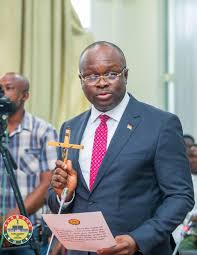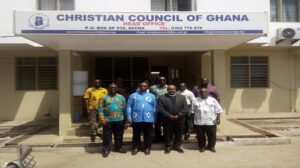Catholic Bishops Support Mahama’s Fight Against Illegal Mining

The Ghana Catholic Bishops’ Conference (GCBC) has publicly thrown its weight behind President John Dramani Mahama’s renewed commitment to eradicating illegal mining, popularly known as galamsey, which continues to wreak havoc on the nation’s environment and social fabric.
During a recent courtesy visit to the President at the Jubilee House in Accra, the President of the GCBC, Most Reverend Matthew Gyamfi, who also serves as the Bishop of the Sunyani Diocese, expressed grave concern over the escalating damage caused by galamsey operations. He called for urgent and far-reaching measures to reverse the environmental, economic, and moral destruction linked to this unlawful activity.
Rev. Gyamfi, leading a 20-member delegation of bishops, congratulated President Mahama on his resounding victory in the December 7, 2024, general elections and emphasized that the time to act decisively against galamsey is now. He proposed that the President declare a limited state of emergency in galamsey-affected areas, enforce a temporary suspension of all mining activities, and deploy military engineering units to begin reclamation of degraded lands.
According to the bishop, illegal mining, which began as a means of subsistence for many, has grown into a deeply entrenched national crisis. “What was once a marginal livelihood option has morphed into a multi-layered threat with serious ecological, economic, and social consequences,” he warned.
The GCBC noted that over 4,000 hectares of forest reserves had been destroyed in the last two years alone. Rivers such as the Pra, Offin, and Ankobrah have become heavily polluted, symbolizing the widespread environmental degradation associated with illegal mining.
Rev. Gyamfi stressed that the destruction caused by galamsey is not limited to the physical environment. He described the situation as a “socio-moral disintegration,” warning that the long-term societal consequences of unchecked mining activities are just as dangerous as the visible environmental damage.
He urged the President to consider a set of legislative and policy reforms. These include repealing or amending legal provisions that permit uncontrolled licensing under the Minerals and Mining Act, 2006 (Act 703), and placing a moratorium on the issuance of new artisanal and small-scale mining licenses until a comprehensive environmental and social impact review is conducted.
Rev. Gyamfi also recommended the formation of district-level mining task forces that include representatives from civil society and the church. These groups would be charged with monitoring local mining operations, reporting violations, and ensuring that communities play a central role in governance and oversight.
The bishops further proposed that the government undertake independent, transparent audits of existing mining concessions to assess environmental impacts, social benefits, and legal compliance. They advocated for the enforcement of mandatory reclamation bonds and the creation of a dedicated environmental restoration fund, to be jointly administered by the government, the church, and traditional authorities.
To ensure sustainable development in mining-affected regions, the GCBC called for the investment of mineral royalties into alternative livelihoods such as vocational training, agroforestry, aquaculture, and ecotourism. Additionally, Rev. Gyamfi urged the implementation of a national blockchain-based system to track the origin of gold and other minerals, aiming to prevent smuggling, promote transparency, and maximize revenue collection.
“Your Excellency,” Rev. Gyamfi concluded, “we, the Catholic Bishops of Ghana, are fully committed to partnering with you to overcome this national challenge. Ending galamsey could become one of the greatest legacies any President has given to Ghana.”
In response, President Mahama expressed appreciation for the bishops’ support and reaffirmed his government’s determination to end illegal mining. He stated that significant progress had already been made in reclaiming parts of forest reserves that had previously been occupied by illegal miners, and assured that more actions would follow.







